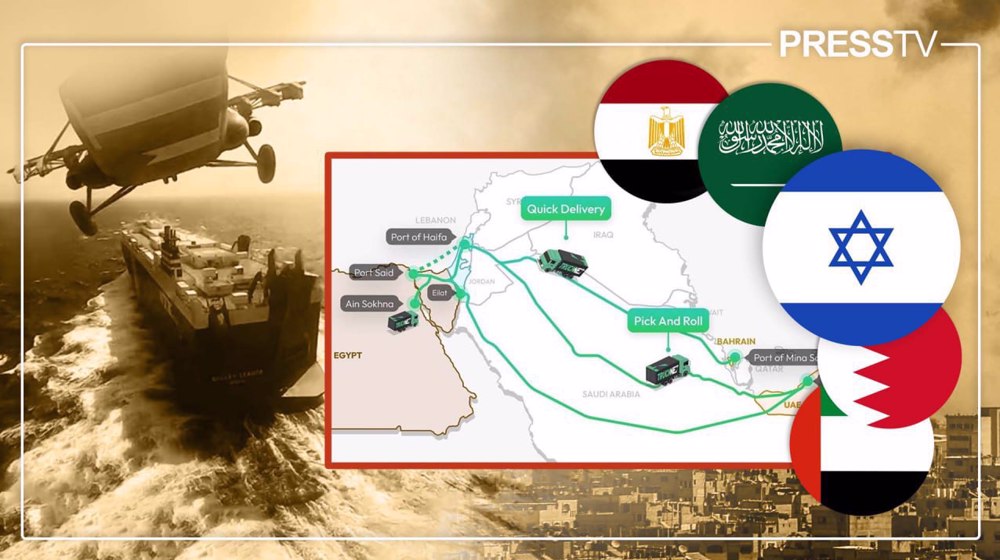Explainer: Who is helping Israel bypass Red Sea blockade imposed by Yemen?
By Reza Javadi
The Israeli regime has lately sought to alter its trade routes in West Asia with the help of some Arab states to import goods and arms, bypassing the Red Sea blockade imposed by Yemen.
It comes amid a string of attacks by the Yemeni military on Israel-linked vessels in the Red Sea since October 7, when the Tel Aviv regime launched its genocidal onslaught on Palestinians in Gaza.
The attacks have forced many prestigious shipping companies to avoid the strategic waterway, inflicting a heavy blow on the Israeli regime’s financial arteries.
According to various reports corroborated by Israeli officials, the regime has turned to an alternative trade route, bypassing the Red Sea, with the help of the United Arab Emirates, Jordan and Saudi Arabia.
A recent report aired by Israel's Channel 13 highlighted a new approach, revealing that ships now depart from Dubai in the UAE, traversing Saudi Arabia and Jordan, and ultimately reaching the Jordan Bridge in the occupied territories.
This intricate operation involves two key players – UAE-based Puretrans FZCO and Trucknet in the occupied territories – both firms collaborating to transport goods via lorries and freight.
This adaptive strategy demonstrates Israel's essential need for goods and weapons in the face of the blockade imposed by the Arab world’s poorest country on the occupying regime.
So, which companies are involved in Israel's plan to bypass the Red Sea?
Israel has strategically employed companies such as Trucknet Enterprise Ltd, a software startup, to facilitate the overland transportation of goods and alleged armaments from Emirati and Bahraini ports into the occupied territories, according to the firm’s Chief Executive Officer Hanan Fridman.
Fridman disclosed that Trucknet, in collaboration with Puretrans FZCO and DP World, has established a bi-directional trade route through Saudi Arabia and Jordan, bypassing the Red Sea.
German shipping company Hapag Lloyd AG, part of the initiative, aims to connect Dubai's Jebel Ali with eastern Saudi ports, seeking alternative routes due to disruptions for Israeli-bound ships in the Red Sea, according to a report by Bloomberg.
The report added that “another of its options connects Jebel Ali with Jordan.”
However, these land routes are considered a temporary fix for limited cargo, acknowledged by Hapag Lloyd AG spokesman Nils Haupt.
Haupt stressed that the routes are slow and difficult, but may help boost commerce through the Arab ports as the Yemeni military’s pro-Palestine operations in the Red Sea continue.
“The land bridge, while carrying a not-insignificant quantity of traffic, will remain a niche solution for shipments specifically to Israel,” Chris Rogers of the US-based S&P Global Inc. market intelligence company was quoted as saying.
Pilot runs in November paved the way for the first shipments in December, with freight forwarder Mentfield Logistics based in the occupied territories also contributing to the trade route by sending goods from Dubai and Bahrain ports.
According to Channel 13, trucks carry the goods from the UAE, crossing into Saudi Arabia through designated routes until reaching Jordan, ultimately entering the occupied territories via the Jordan River Crossing and heading to Haifa.
The goods pass through Saudi Arabia even though Riyadh has no diplomatic relations with the Tel Aviv regime, drawing anger and outrage from pro-Palestine campaigners across the world.
“Ships coming from China and India unload containers in the ports of Bahrain and Dubai, and then the cargo is loaded onto Jordanian trucks and is transferred overland to Israel via the King Hussein border crossing with Jordan, where Israeli trucks await the goods,” Mentfield CEO Omer Izhari said.
Yemen’s armed forces shot down an American MQ9 aircraft in Hudaydah while it was carrying out hostile missions. pic.twitter.com/GRV7JjRjkv
— Press TV 🔻 (@PressTV) February 19, 2024
He emphasized that the service ensures goods destined for the Israeli-occupied territories do not get tracked as Israeli goods during transit through Saudi Arabia.
“In the service that we offer, the goods are destined for Israel, but they go through transit to come to Israel and don’t travel or get tracked as Israeli goods,” said Izhari.
“The Saudi government would not allow ‘Israeli goods’ to go through their territories.”
In response to the challenges posed by US-UK warships in the Red Sea and the Suez Canal, Denmark's Maersk, Hapag-Lloyd, and BP temporarily suspended sending vessels through this key trade route.
The Israeli regime, aiming to diversify routes, is developing plans to enable the overland transfer of goods from India through Abu Dhabi, shortening shipping times, Indian Transportation and Road Safety Minister Miri Regev announced in January.
The overland route is expected to shorten shipping times by 12 days, Regev said.
However, last week, India’s leading maritime union said it won’t be loading or unloading weaponized cargos destined for the occupied Palestinian territories.
“Port workers, part of labor unions would always stand against the war and killing innocent people like women and children,” said the Water Transport Workers Federation of India, representing 3,500 workers at 11 major Indian ports.
“The recent attack of Israel on Gaza plunged thousands of Palestinians into immense suffering and loss. Women and children have been blown to pieces in the war. Parents were unable to recognize their children killed in bombings which were exploding everywhere.”
Meanwhile, the Yemeni military continues its operations against vessels linked to the Israeli regime.
Except for ships belonging to the US and UK – who bombarded Yemen numerous times last month – many vessels have safely transited the Red Sea by broadcasting “No relation to Israel” on their identification systems, according to Yemeni authorities.

Four Israeli ministers call for annexation of occupied West Bank

Smotrich: Returning captives not Israel’s primary goal

‘Collective punishment’ of Palestinians unjustifiable: UNRWA
VIDEO | Exclusive: Yemeni eyewitnesses say US warplanes targeted civilians in their homes
VIDEO | Press TV's news headlines
‘Guardians of Revolution’: IRGC warns enemies it is at ‘peak of all-out readiness’
Microsoft collaboration in Gaza genocide
VIDEO | Senior Hamas-allied leader killed in Israeli drone strike south of Beirut
Syria arrests Islamic Jihad officials after US ties sanctions relief to ban on Palestinian groups
Gaza children dying not only from bombs, but hunger: Health Ministry
Israeli strikes kill nearly 10 Gazans, including two children, in new aggression













 This makes it easy to access the Press TV website
This makes it easy to access the Press TV website